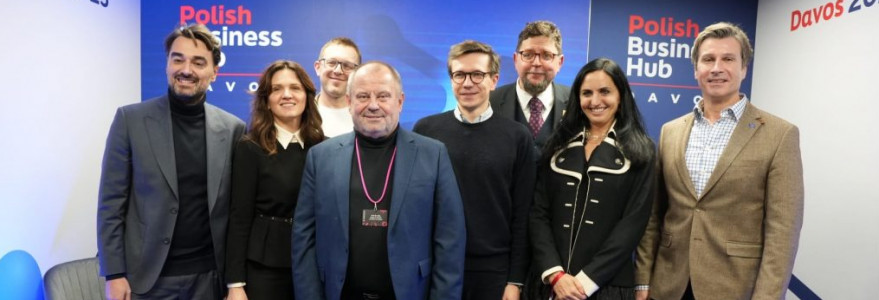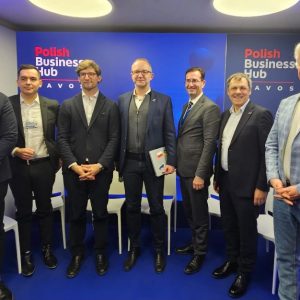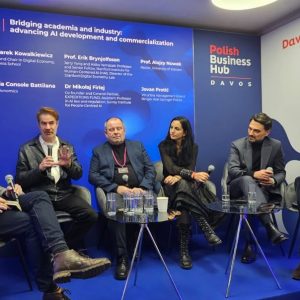“The UW, in cooperation with other leading Polish universities, is active in creating a strong domestic and foreign environment for supporting the development of both basic and applied research and the use of its results through commercialisation and the creation of start-ups,” Prof. Alojzy Z. Nowak, the UW Rector, said. A representation of the UW including the Rector, the Chancellor and scientific experts attended events accompanying the 55th World Economic Forum in Davos.
On 22nd January, Prof. Alojzy Z. Nowak, the UW Rector, participated in a panel on artificial intelligence in the context of its development and commercialisation, organised as part of the Polish Business Hub – an event accompanying the 55th World Economic Forum in Davos.
“The University of Warsaw, in cooperation with other leading Polish universities, is active in creating a strong domestic and foreign environment for supporting the development of both basic and applied research and the use of its results through commercialisation and the creation of start-ups that provide opportunities to bring science and business even closer together,” the Rector of the University of Warsaw said, adding: “One can see a growing understanding and support in this matter from both individual government institutions and companies operating in Poland. This is particularly important now – at a time of rapid development of artificial intelligence and growth of innovation and entrepreneurship at the UW and many other Polish universities. These processes increase the chances of intensifying research, its implementation in the economy, as well as increasing the activity of people both working and studying at the university.”
The meeting, attended by prominent AI experts, including Prof. Erik Brynjolfsson, director of the Stanford Digital Economy Lab, discussed opportunities for collaboration between academia and industry to accelerate AI innovation and bringing solutions to market.
Decarbonisation and transformation
“AI is a new player in decarbonisation right now, and in the future it could even account for 10% of energy consumption. Hence, there is a need not only for a new approach in providing clean energy for the development of AI, but also for research into new more efficient algorithms,” Prof. Piotr Sankowski from the UW’s Faculty of Mathematics, Informatics and Mechanics, said.
The researcher was a participant in the meeting entitled “Industrial decarbonisation and energy transitions: competitiveness, opportunities, and the evolving role of the private sector”, held on 23rd January as part of the Polish Business Hub. Experts discussed the dual challenge of achieving industrial decarbonisation while maintaining global competitiveness in a changing energy market.
The panel also included Dr Tomasz Ludwicki, director of the UW’s International Management Center and acting CEO of LOT Polish Airlines.
“Decarbonising aviation is no longer a choice, but a necessity in the face of climate change and ensuring a sustainable future. However, it comes with significant challenges as the industry faces high costs, technological barriers and the need to remain competitive. Achieving net zero emissions in aviation is a key step towards sustainability, highlighting the sector’s growing responsibility,” Dr Ludwicki said.










